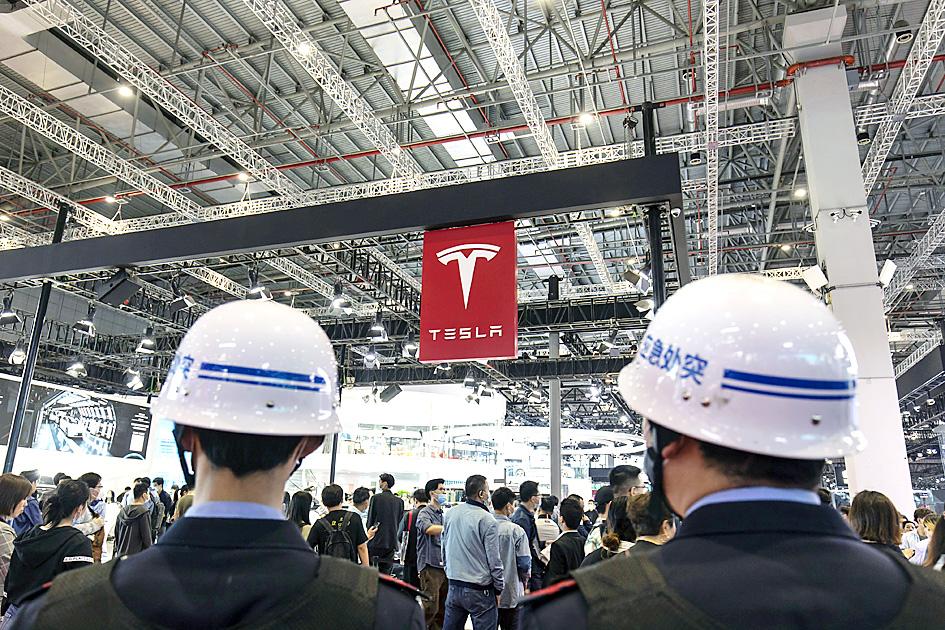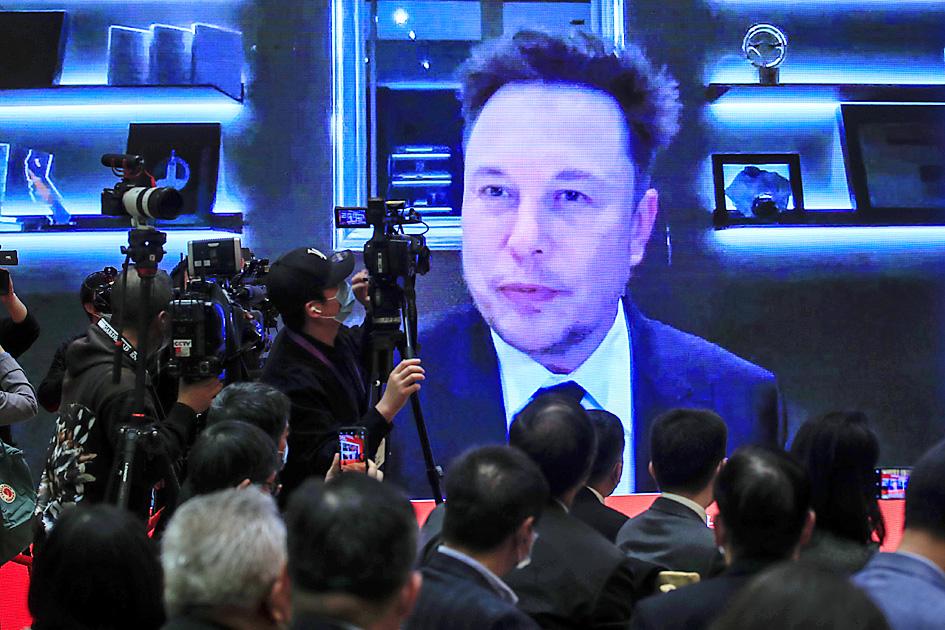Electric vehicle maker Tesla Inc, facing scrutiny in China over safety and customer service complaints, is boosting its engagement with regulators and beefing up its government relations team, industry sources said.
Tesla’s change of strategy leading to more behind-the-scenes interaction with policymakers in Beijing compared with relatively little previously shows the seriousness with which the US automaker views the setbacks in its second-biggest market.
TALKING SHOP

Photo: Bloomberg
It also comes at a time when China is trying to regulate large and powerful private companies, especially in the technology sector, on concerns about their market dominance.
As they do elsewhere, regulators in China, the world’s biggest auto market, discuss industry policies and standards with global and local companies, industry associations and think tanks.
In the past few weeks, Tesla executives attended at least four policy discussions, on topics including auto data storage, vehicle-to-infrastructure communication technologies, vehicle recycling and carbon emissions, the people said.

Photo: EPA-EFE
California-based Tesla, which makes electric Model 3 sedans and Model Y sport utility vehicles at its own plant in Shanghai, did not make major commitments at the meetings, but participated in some discussions, they said.
SEEKING HARMONY
Tesla is also expanding its government relationship team in China, one of the sources said.
According to two recruitment advertisements last month on its WeChat account, Tesla is hiring managers to update a policy database and maintain relationships with government and industry associations to “build a harmonious external environment to support Tesla’s business development in the regional market.”
Accounting for roughly 30 percent of Tesla’s global sales, China is the automaker’s second-biggest market after the US and helped it post record first-quarter vehicle deliveries.
PRESSURE MOUNTS
Pressure has been building over the past few months on Tesla’s mostly excellent relations with Beijing.
In February, Chinese regulators summoned it over consumer reports of battery fires, unexpected acceleration and failures in over-the-air software updates.
In March, Tesla came under scrutiny when the military banned its vehicles from entering its complexes, citing security concerns over cameras, sources said.
Days later, chief executive Elon Musk appeared by video at a high-level forum, saying that if Tesla used vehicles to spy in China or anywhere, it would be shut down.
Last month, Tesla was targeted by state media and regulators after a customer, angry over the handling of her complaint about malfunctioning brakes, climbed on top of a Tesla vehicle in protest at the Shanghai auto show. Videos of the incident went viral.
Grace Tao (陶琳), a Tesla vice president who heads its government relations effort in China, was criticized in state media last month after she was quoted in a media interview questioning whether the aggrieved customer was acting on her own.
In response to the complaints, Tesla said it would set up a China data center, launch self-inspection to improve services and work with regulators.

South Korea’s equity benchmark yesterday crossed a new milestone just a month after surpassing the once-unthinkable 5,000 mark as surging global memory demand powers the country’s biggest chipmakers. The KOSPI advanced as much as 2.6 percent to a record 6,123, with Samsung Electronics Co and SK Hynix Inc each gaining more than 2 percent. With the benchmark now up 45 percent this year, South Korea’s stock market capitalization has also moved past France’s, following last month’s overtaking of Germany’s. Long overlooked by foreign funds, despite being undervalued, South Korean stocks have now emerged as clear winners in the global market. The so-called “artificial intelligence

NEW IDENTITY: Known for its software, India has expanded into hardware, with its semiconductor industry growing from US$38bn in 2023 to US$45bn to US$50bn India on Saturday inaugurated its first semiconductor assembly and test facility, a milestone in the government’s push to reduce dependence on foreign chipmakers and stake a claim in a sector dominated by China. Indian Prime Minister Narendra Modi opened US firm Micron Technology Inc’s semiconductor assembly, test and packaging unit in his home state of Gujarat, hailing the “dawn of a new era” for India’s technology ambitions. “When young Indians look back in the future, they will see this decade as the turning point in our tech future,” Modi told the event, which was broadcast on his YouTube channel. The plant would convert

‘SEISMIC SHIFT’: The researcher forecast there would be about 1.1 billion mobile shipments this year, down from 1.26 billion the prior year and erasing years of gains The global smartphone market is expected to contract 12.9 percent this year due to the unprecedented memorychip shortage, marking “a crisis like no other,” researcher International Data Corp (IDC) said. The new forecast, a dramatic revision down from earlier estimates, gives the latest accounting of the ongoing memory crunch that is affecting every corner of the electronics industry. The demand for advanced memory to power artificial intelligence (AI) tasks has drained global supply until well into next year and jeopardizes the business model of many smartphone makers. IDC forecast about 1.1 billion mobile shipments this year, down from 1.26 billion the prior

People stand in a Pokemon store in Tokyo on Thursday. One of the world highest-grossing franchises is celebrated its 30th anniversary yesterday.